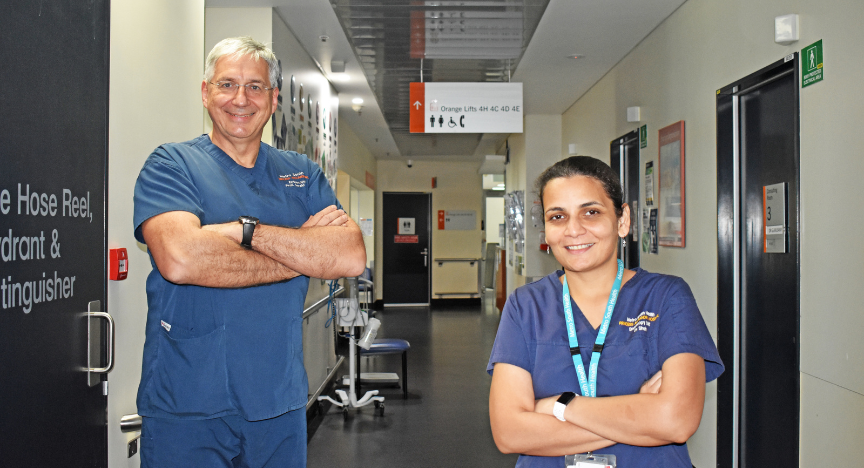
Princess Alexandra Hospital Gastroenterologist and gut inflammation researcher, Professor Gerald Holtmann and his team have been successful in the award of a Queensland Technology Future Fund grant to introduce Confocal Laser Microscopy to benefit patients with severe food allergies and intolerances.
The miniature confocal laser microscopy probe allows in-vivo (within the person, not in a test tube) assessment of immune responses of the human gastrointestinal tract during routine gastrointestinal endoscopy.
The miniprobe is easily used as part of a standard scope with workflows within the department accommodating testing for patients with severe immune responses.
Professor Holtmann said the scope allows clinicians to see alterations in the epithelial cell structure when the mucosa of the gut is exposed to different allergens.
“Using fluoresceine as a marker, the miniprobe allows us to see a highly magnified view of the cells surrounded by dark spaces before exposure. After exposure to the allergen, the dark spaces fill with the white tracer highlighting a positive response to an allergen requiring dietary intervention,” he said.
“Patients who would benefit from this diagnostic tool tend to be severely malnourished, requiring enteral and parenteral tube feeding – they are quite miserable, with limitations to their lives.
“This technology brings hope of change. The testing allows us to identify specific triggers brought on by food intolerances and enables tailored dietary interventions for each patient’s unique needs.”
The benefits of this diagnostic tool go further than addressing the gut issue by improving the lives of patients affected by food intolerances and also reducing costs. Enteral and parenteral nutrition is associated with substantial morbidity as well as excessive direct and indirect healthcare costs.
“Patients with severe food allergies report that every day is a struggle to find something they can eat, the constant quest to understand what is wrong with them and that they are just looking for a solution to their energy levels as well as the need to work and be part of their families’ lives,” he said.
“The introduction of this technology will help find those solutions for many Queenslanders with complex motility disorders and deliver on an unmet clinical need within our Gastroenterology service.”
The QTFF funding is for the 25/26 year with some residual available for 26/27. Prof Holtmann’s team includes Dr Ayesha Shah, Dr Naomi Moy and Mr Thomas Fairlie.